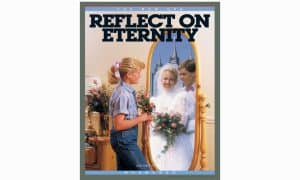“Curse God and die.”
These are the grief-saturated words of Job’s wife, one of the most tragically misrepresented women in the Hebrew Bible. Here is a woman who lost everything–first her livelihood and standing in the community and then, in one freak storm, the 10 children that she carried, bore and raised. As she mourns the loss of her family, she comes to her husband, only to find him ill and covered with boils. Doubtless she fears she is going to lose him too; she must wonder what she has done to deserve this. The two must converse; they must lament all that has been taken from them and, if they are like any human, wonder why these things are happening to them. Maybe she comforts him. Maybe he comforts her. Maybe both, in their hearts, feel they have lost too much. Who could blame them in that moment?
All we hear, however, is these words: “Do you still persist in your integrity? Curse God, and die” (Job 2:9).
Then she disappears, both literally and literarily. Job’s wife exists merely as a foil for Job to prove his faithfulness, and get a dig in at the “foolish” and faithless woman, and then she is gone. Job gets a book, friends, advocates, an audience with God–his wife does not even get a name. Everything that he lost, she lost as well, yet her sacrifice is subsumed by the seeming callousness of those words: “Curse God, and die.”
Mrs. Job deserves better.
‘A 10,000-year-old silent scream’
This is how feminist biblical scholar Alicia Ostriker described her reaction when she reached the end of the book of Job, which ties everything up neatly, even replacing dead 10 children with 10 new ones. The numbers add up, the author of the book seems to say, so … all good, right?
With her pen, Ostriker imagined what Mrs. Job knew of her husband’s God and what she “would/will say to God when she acquires the courage to challenge God as her husband did” (Ostriker, 2017: 188). This matters, Ostriker writes, because Mrs. Job is all of us–she is every woman who suffers loss, whose voice is silenced, whose sacrifices are brushed aside, who are both too angry and not angry enough, whose hurts are tossed away because the problem has been resolved so the past doesn’t matter anymore. Eventually it will become too much, and she will demand justice for the heartbreak that can never be made right but still deserves recognition, apology and atonement:
“[S]he will need a large recompense because she will be asking: Where are my dead sons? What about the women executed as witches and whores? What of the beaten wives? What of the massacred Sioux, the deliberately starved Ukrainians? Why do the bones of many million Africans lie rotting below the Atlantic Ocean? Where are the souls who rose in smoke over Auschwitz? You teach me to say The wicked shall vanish like smoke, when all tyranny shall be removed from the earth, but it was innocent babies who vanished. She wants the unjustly slain to be alive and for singing and dance to come to the victims” (240).
Ostriker, a Jewish woman who grew up in the shadow of the Holocaust, cried out for those people in 1994. Three decades on, how much more silent screaming is there? The millions lost to COVID-19, women and men, boys and girls who cried out against their abusers, the victims of war throughout the world, the minority communities being targeted just because of who they are.
Justice for Mrs. Job
The short answer: It doesn’t exist. Job’s wife gets neither justice nor mercy in the 42 chapters dedicated to her husband. She hasn’t gotten much in the intervening millennia either.
Sadly, neither have many women, then or now.
Is justice for the women ignored and cast aside by a god of men possible today? I badly want to say yes. If I am totally honest with myself, I can’t.
But if we are not yet at justice, we can demand a reckoning. We can demand to not be silent or silenced any longer. To some people, those demands sound like we are saying, “Curse God* and die.” It is, after all, easier to dismiss a woman’s words because they’re difficult to hear, because they do not have an easy answer, because they present an idea that no man has considered than to acknowledge the real pain and fear behind those words or attempt to explain the actions of a just God that don’t seem very just at all.
* Interestingly, in the NRSV, the footnote for “curse” is the Hebrew word for “bless.” That obviously changes everything. But the most important thing to take away from that is the reminder that the Bible is, well, sort of a train wreck of translations, revisions, writing down stories that have been passed down orally for millennia, scribes intentionally or accidentally making changes, King James interpreting a pro-government bent to the scriptures, making sure the message at the end of the day was monotheistic … just so much. Love the Bible, read the Bible, but have a good sense of the mounds of various hands that have touched it in the last 5,000 years or so.
Photo: In the Jordanian desert, there are Midianite cave etchings of a woman giving birth. Archaeologists today wonder if Midianite women came to this cave, alone, to give birth. Is this what Job’s wife experienced with each birth? Little wonder that the loss of her children felt like such a curse.
Ostriker, Alicia Suskin. “The Wandering Jewess: Feminism Seeks the Shekhinah.” The Bible and Feminism: Remapping the Field, edited by Yvonne Sherwood, 186-199. Oxford: Oxford University Press, 2017.










4 Responses
Wow! This is beautiful and powerful (and a little painful, but in a good way)
“Mrs. Job is all of us–she is every woman who suffers loss, whose voice is silenced, whose sacrifices are brushed aside, who are both too angry and not angry enough, whose hurts are tossed away because the problem has been resolved so the past doesn’t matter anymore. Eventually it will become too much, and she will demand justice for the heartbreak that can never be made right but still deserves recognition, apology and atonement” I had not put myself in her shoes like that before, thanks.
In case you haven’t read it, Michael Austin’s book “Re-reading Job” is excellent. It helped me to see God as incomprehensibly bigger than the Heavenly Father we talk about at church.
“. . . but it was innocent babies who vanished.” Thank you for the beautiful, heart aching post. Thank you for bringing attention to another unnamed mother of the Bible and letting her silent scream reach me and join mine.
Thank you for reminding us that it wasn’t only Job who lost everything. It is so good to remember the characters the Biblical writers forgot.